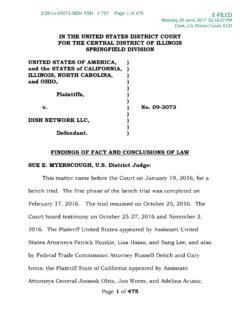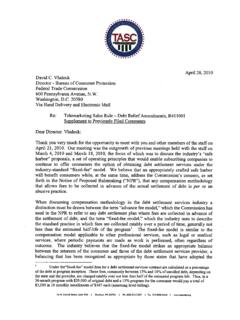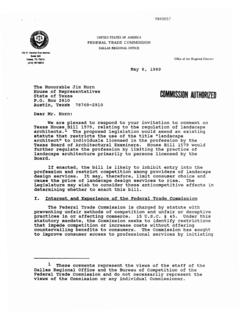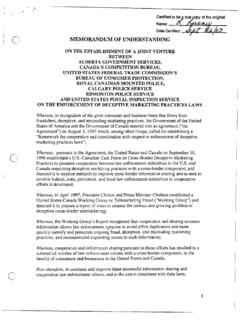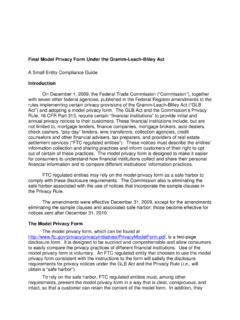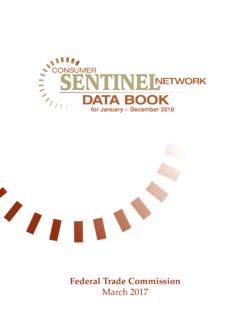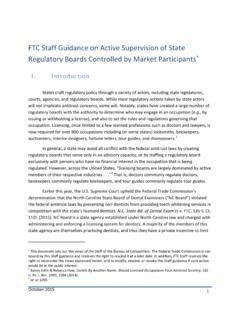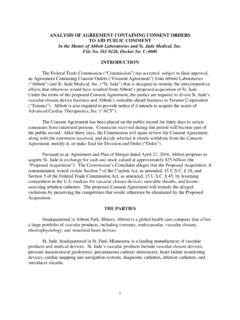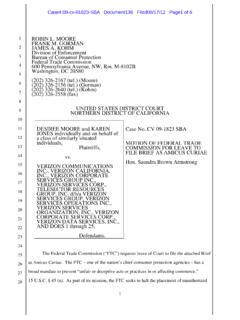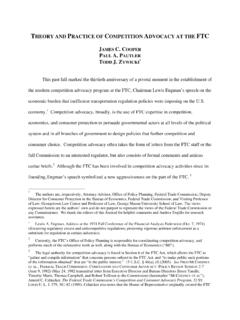Transcription of Guides Concerning the Use of Endorsements and Testimonials ...
1 FEDERAL TRADE COMMISSION16 CFR Part 255 Guides Concerning the Use of Endorsements and Testimonials in Advertising* * * *This document includes only the text of the Revised Endorsement and Testimonial Guides . Tolearn more, read the Federal Register Notice at * * * * Purpose and definitions.(a)The Guides in this part represent administrative interpretations of laws enforced by theFederal Trade Commission for the guidance of the public in conducting its affairs in conformitywith legal requirements. Specifically, the Guides address the application of Section 5 of the FTCAct (15 45) to the use of Endorsements and Testimonials in advertising.
2 The Guides providethe basis for voluntary compliance with the law by advertisers and endorsers. Practicesinconsistent with these Guides may result in corrective action by the Commission under Section 5if, after investigation, the Commission has reason to believe that the practices fall within the scopeof conduct declared unlawful by the Guides set forth the general principles that the Commission will use in evaluatingendorsements and Testimonials , together with examples illustrating the application of thoseprinciples. The Guides do not purport to cover every possible use of Endorsements in advertising.
3 Whether a particular endorsement or testimonial is deceptive will depend on the specific factualcircumstances of the advertisement at issue.(b) For purposes of this part, an endorsement means any advertising message (including verbalstatements, demonstrations, or depictions of the name, signature, likeness or other identifyingpersonal characteristics of an individual or the name or seal of an organization) that consumers arelikely to believe reflects the opinions, beliefs, findings, or experiences of a party other than thesponsoring advertiser, even if the views expressed by that party are identical to those of thesponsoring advertiser.
4 The party whose opinions, beliefs, findings, or experience the messageappears to reflect will be called the endorser and may be an individual, group, or institution.(c)The Commission intends to treat Endorsements and Testimonials identically in the contextof its enforcement of the Federal Trade Commission Act and for purposes of this part. The termendorsements is therefore generally used hereinafter to cover both terms and situations.(d) For purposes of this part, the term product includes any product, service, company orindustry.(e)For purposes of this part, an expert is an individual, group, or institution possessing, as aresult of experience, study, or training, knowledge of a particular subject, which knowledge issuperior to what ordinary individuals generally 1: A film critic s review of a movie is excerpted in an advertisement.
5 When soused, the review meets the definition of an endorsement because it is viewed by readers asa statement of the critic s own opinions and not those of the film producer, distributor, orexhibitor. Any alteration in or quotation from the text of the review that does not fairlyreflect its substance would be a violation of the standards set by this part because it woulddistort the endorser s opinion. [See (b).]Example 2: A TV commercial depicts two women in a supermarket buying a laundrydetergent. The women are not identified outside the context of the advertisement. Onecomments to the other how clean her brand makes her family s clothes, and the other thencomments that she will try it because she has not been fully satisfied with her own brand.
6 This obvious fictional dramatization of a real life situation would not be an endorsement. Example 3: In an advertisement for a pain remedy, an announcer who is not familiar toconsumers except as a spokesman for the advertising drug company praises the drug sability to deliver fast and lasting pain relief. He purports to speak, not on the basis of hisown opinions, but rather in the place of and on behalf of the drug company. Theannouncer s statements would not be considered an 4: A manufacturer of automobile tires hires a well-known professionalautomobile racing driver to deliver its advertising message in television commercials.
7 Inthese commercials, the driver speaks of the smooth ride, strength, and long life of the tires. Even though the message is not expressly declared to be the personal opinion of the driver,it may nevertheless constitute an endorsement of the tires. Many consumers will recognizethis individual as being primarily a racing driver and not merely a spokesperson orannouncer for the advertiser. Accordingly, they may well believe the driver would notspeak for an automotive product unless he actually believed in what he was saying and hadpersonal knowledge sufficient to form that belief.
8 Hence, they would think that theadvertising message reflects the driver s personal views. This attribution of the underlyingviews to the driver brings the advertisement within the definition of an endorsement forpurposes of this 5: A television advertisement for a particular brand of golf balls shows aprominent and well-recognized professional golfer practicing numerous drives off the tee. This would be an endorsement by the golfer even though she makes no verbal statement inthe advertisement. Example 6: An infomercial for a home fitness system is hosted by a well-known entertainer.
9 During the infomercial, the entertainer demonstrates the machine and statesthat it is the most effective and easy-to-use home exercise machine that she has ever tried. Even if she is reading from a script, this statement would be an endorsement, becauseconsumers are likely to believe it reflects the entertainer s 7: A television advertisement for a housewares store features a well-knownfemale comedian and a well-known male baseball player engaging in light-hearted banterabout products each one intends to purchase for the other. The comedian says that she willbuy him a Brand X, portable, high-definition television so he can finally see the strikezone.
10 He says that he will get her a Brand Y juicer so she can make juice with all the fruitand vegetables thrown at her during her performances. The comedian and baseball playerare not likely to be deemed endorsers because consumers will likely realize that theindividuals are not expressing their own 8: A consumer who regularly purchases a particular brand of dog food decidesone day to purchase a new, more expensive brand made by the same manufacturer. Shewrites in her personal blog that the change in diet has made her dog s fur noticeably softerand shinier, and that in her opinion, the new food definitely is worth the extra money.
